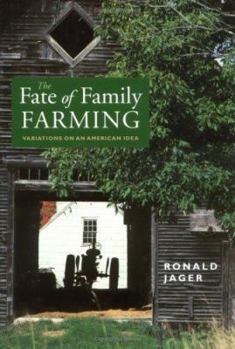The Fate of Family Farming: Variations on an American Idea
Select Format
Select Condition 
Book Overview
The Fate of Family Farming employs a hands-on approach, with much local New England detail, in its exploration of the history and future of American family farming as an idea and as an ongoing way of... This description may be from another edition of this product.
Format:Hardcover
Language:English
ISBN:1584650265
ISBN13:9781584650263
Release Date:January 2004
Publisher:University Press of New England
Length:268 Pages
Weight:1.30 lbs.
Dimensions:1.0" x 6.4" x 9.2"
Customer Reviews
3 ratings
Farming in a global community
Published by Thriftbooks.com User , 15 years ago
Ronald Jager cares deeply about the "The Fate of Family Farming", which is the title of his latest book. His interest has very personal roots. Jager grew up on a farm near McBain, Michigan (not far from Reed City, where I grew up), and wrote movingly (and often quite humorously) of those formative years in his 1990 memoir, "Eighty Acres: Elegy for a Family Farm", which I re-read recently and found it to be one of those rare books which improves with age and yields new pleasures and insights with each reading, the mark of a true classic. Jager left the farm over fifty years ago when he went off to Calvin College, then Harvard, and finally landed at Yale where he taught philosophy for a number of years. He has lived in rural New Hampshire for over thirty years now and has obviously immersed himself in the community, the culture and the history of his adopted state, and has written extensively of all these things. In "FoFF" Jager first sketches a brief history of four hundred years of farming in America, starting with the first pilgrims who landed on our shores pitifully ill-equipped. Many of these first settlers died, and those who did not owed their survival to the generosity of Native Americans who shared their corn and knowledge of primitive farming methods. Jager then cites two early presidents, Adams and Jefferson, as champions and practitioners of farming. Jefferson described farmers as "the most valuable citizens [and also] the most vigorous, the most independent, the most virtuous ..." Emerson, Thoreau and other nineteenth century writers also weigh in on farming before Jager focuses in on three contemporary agrarian writers from the second half of the twentieth century. Louis Bromfield was an enormously successful writer turned farmer whose experimental Malabar Farm in Ohio became a showcase in the forties and fifties. Victor Davis Hanson, a classics professor and also a California fruit farmer is also heard from, and, in his "Field without Dreams" (1996), writes: "we are now in the penultimate stage of the death of agrarianism, the idea that farmland of roughly like size and nature should be worked by individual families." Finally, the writings of writer-farmer Wendell Berry of Kentucky are examined, particularly his scathing indictment of modern corporate agribusiness in "The Unsettling of America: Culture and Agriculture" (1977). Twenty-five years later Berry pointed out: "In 2002 we have less than half the number of farms in the United States that we had in 1977." At the heart of "FoFF" however are in-depth profiles of four farms and the families who are currently operating them in New Hampshire. One is a modern "sugarbush", or maple syrup operation, which bears very little resemblance to the small-time sugarbushes that flourished throughout the west Michigan of my childhood. The metal spiles, buckets and boiling tubs of those days have been replaced by miles of plastic tubing, vacuum systems, and reverse osm
Perfect side-dish to your organic diet
Published by Thriftbooks.com User , 19 years ago
I love food, especially of the locally-grown, organic type. This love comes from childhood memories of going to the farmers market, the excitement of being able to eat creamy spinach again after a nine month lull when it was out of season... But I've been shopping in a supermarket for the last 30 years, and feel as if I've fully lost contact with how the food actually to my fridge. This book comes to the rescue. The author talks about history of family farms in US, and then does 4 case studies of today's working farms. Maple syrup, Milk, Chickens, they are all in there. Great stuff, he writes well, and kept me turning page after page. Highly recommended to those who enjoy intelligent writing and good food.
A candid assessment of ever-changing farm technology
Published by Thriftbooks.com User , 19 years ago
Former philosophy professor Ronald Jager presents The Fate Of Family Farming: Variations On An American Idea, a thoughtful examination of the history and future of the American family farm as a concept and as a way of life. Exploring both the ideals of "agrarianism" and the practical realities of agribusiness, as well as anecdotal portraits of present-day maple syrup, eggs and corn, milk, and apple farms, and a candid assessment of ever-changing farm technology, The Fate Of Family Farming lives up to its title by offering not only an in-depth portrait of the American farm today but also well-reasoned projections for the American farm of the future, for good or for ill. Very highly recommended reading for anyone concerned with the seeming demise of the family farm in the face of the global phenomena of agribusiness.




